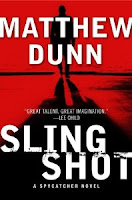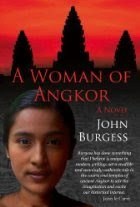My
review of the political thriller
Slingshot has this accompanying Q and A with British author Matthew Dunn which was not posted but which I am now printing here.
About Slingshot: Master spy Will Cochrane must catch a missing Russian defector as well as one of Europe’s deadliest assassins in this action-packed follow-up to previous novels in the series,
Spycatcher and
Sentinel.
Former MI6 agent and author of the Spycatcher series,
Matthew Dunn gives readers a peek into his former life.
1.
How did you conceive of the character Will Cochrane? How is he like you, at least you when you were working? How is he different?
I wanted to create a character who personified the reality of intelligence work that operatives do in the field – the loneliness, the requirement to make tough decisions on the ground without being able to call for support from headquarters, the moral ambiguities of those decisions, the strong intellectual prowess, and the relentless mindset. An operative also needs a tough body, yet one that can be filled with both love and respect for the people around him. Cochrane is a lot like me when I was in MI6, though his family background is different. I’m now ten years older than he is, have two children, am recently married, and write for a living. I’m no longer Will Cochrane.
2.
Do you see writing spy novels as a way to shed light on popular misconceptions or educate readers about the realities of international politics today?
In essence, there are two primary activities of spy agencies: the long-game of running foreign spies to obtain intelligence that can inform the foreign policies of the agency’s government; and covert, frequently extremely violent, paramilitary actions. The primacy of either activity ebbs and flows depending on the circumstances of the times. During the Cold War, all sides knew that pulling a gun was counterproductive as there was a standoff on all levels. Since then, things have been very different and that was reflected in my work as an operative, though I was also very involved in the running of foreign assets and at one time was living under deep cover with 15 different alias identities. My novels are fiction of course, but they reflect what can and does happen in the field, all of which never makes the papers unless something goes terribly wrong. Even then there are mechanisms in place to block or misdirect public scrutiny. The biggest misconception about the reality of espionage is that it is not exciting and extremely dangerous. That is very wrong. My novels reflect the realities of being in the field. I have no point to make, beyond telling it how it is.
3.
While you probably can’t get too specific about this, how do you translate your experiences as an MI6 agent into the scenes and characters in your novels?
One of the joys of writing fiction is that I can disguise my experiences inside a fictional tale. In SLINGSHOT, you’ll read about real events and people. The names of the people have obviously been changed, and the events take place in different locations and under different circumstances. I will leave it to readers to attempt to deduce truth from fiction.
When I write, I see everything through the prism of being an MI6 officer. A frequent question I will ask myself is, “what would I have done?’ It’s a useful question and there is often no right or wrong answer, just as it is in the field when you’re an operative and you’re faced with intractable problems. Will Cochrane makes mistakes, as I have done in real life, has to recover from those mistakes, and has to keep going. The people I write about are similar to people I know. The events are similar to those that I and others have been in. That’s the world I know. I concede it’s very different from the world that most others know.
4.
From James Bond to Will Cochrane, what do you think accounts for the timeless appeal of fiction featuring dashing spies?
Though I never wrote the Spycatcher series with comparisons in mind to Bond (or for that matter, at the opposite end of the spectrum, John le Carré’s George Smiley), it is understandable that comparisons are made. I write my novels with a contemporary and very precise understanding of espionage and for that reason Cochrane is different to other fictional espionage characters.
Regardless, all share in common a dislocation from the real world in favor of an understanding of a very real, yet secret world that is all pervasive and often deadly. Such characters' ability to operate in that world, and to be supremely intelligent, often charming, frequently deadly, is very intriguing. But more than that, I think the ability of operatives to be chameleons has a tremendous appeal. Readers want to know who they really are. That is a challenge.
5.
SLINGSHOT concerns some of the Cold War “loose ends” left behind in Europe after the fall of the Berlin Wall. What do you think most people don’t know about what’s going on in that part of the world today?
Most people don't understand the threat from foreign states. Right now, Russia, Iran, the Israel/Palestine conundrum, China, North Korea, and Syria are the biggest threats to world peace. Terrorism pales in comparison to what these states can do. After the collapse of communism, Russia re-built itself on a capitalist platform. It is aggressive to the West and, alongside China, does not want to be a responsible world power, as evidenced by its repeated vetoes in UN Security Council proposed resolutions to stop genocide in places like Syria.
The nuclear powers who have the capability to destroy the world are the United States, Great Britain, France, Russia, and China. Three of those "big 5" are responsible. Two are not.
6.
What are Will Cochrane’s greatest weaknesses as a spy and as a person?
Cochrane has a huge heart and yearns for another life, particularly with a woman who would love him for who he truly is. This is his strength, rather than weakness, but of course - in the world in which he operates - love and compassion are honorable traits that evil men will use against him.
7.
Could a frightening story like the one in SLINGSHOT actually take place today?
Something similar and dreadful nearly took place. I know, but can't reveal details.
8.
There are a few pivotal roles played by women in SLINGSHOT: a retired operative named Betty who’s brought in on a vital assist; and a whip-smart CIA analyst named Suzy. Did these women come to life entirely from your imagination? Or did you work in the field with women like these?
I've met some of the bravest women and men in the world. Gender doesn't differentiate them; they are the same breed of unique animal. I can't give you details of specifics about people I knew beyond one anecdote.
During one of my trips to MI6's training facility, I walked off the shooting range and confronted an old woman. It was common to meet unusual people in the facility as we often received briefings from Cold War warriors, for example, from both sides of the Western/USSR fence in order to inform the contemporary work we did. But I'd never seen this woman before. She asked me what I was doing and I told her that I'd just been testing a new customized handgun. She immediately had a look of horror and said, "Guns terrify me!". I smiled, walked her to the range and showed her how to shoot it. She took the gun from me and, ignoring my instructions to position the weapon at eye-level, then held the gun against her belly and fired five shots at the target. All hit a tiny radius around the target that any Special Forces operative would have been proud to strike. I asked her how she did it, given she looked as fragile and as old as my grandmother. She didn’t answer, but just smiled and walked off.
That evening I found out she was a former British Special Operations Executive officer who'd been parachuted into Nazi-occupied France and the Netherlands, who'd blown up German transportation lines, had - together with the resistance civilians she'd rallied - killed hundreds of Nazis, and had ultimately been captured by the Gestapo who put her in dungeons, brutally tortured her, before sending her to an extermination camp.
Men and woman, young and old, risk their lives every day by operating in the secret world. I know many of them, and in my novels you'll meet some of them as well. Women like Betty and Suzy existed. SLINGSHOT is my heartfelt homage to them.
--
-----------------------------------------------------------------------------------------------------------------------
What do you think of the interview and the author's world view? Do you agree with Mr. Dunn about the political world as it is now?
For
reviews of
Slingshot, visit the
Partners in Crime Book Tour schedule.




























 Welcome to the
Welcome to the




